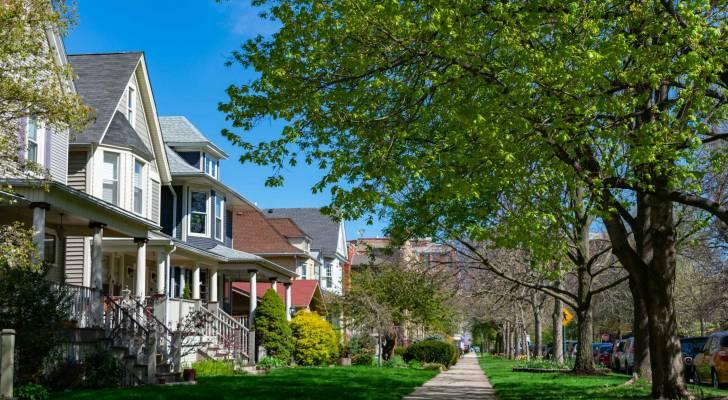Despite another weekly jump in mortgage rates, analysts say the relentless increases could soon come to an end — or at least pause amid fears of how new COVID-19 strains will affect the reviving U.S. economy.
That should be welcome news to would-be borrowers who have been sitting on the fence, waiting for rates to fall — or at least show some sign of moderating — before shopping for a loan to buy a house or refinance a home.
Rates on the popular 30-year fixed-rate mortgage have solidly eclipsed the 3% mark, but some watchers report they’re seeing lower rates for qualified borrowers.
Here are the latest average rates from a long-running survey, plus the current intel on where mortgage rates may be heading.
30-year mortgages

The average rate on a 30-year, fixed-rate mortgage increased to 3.17% last week, up from 3.09% a week earlier, mortgage giant Freddie Mac reported on Thursday. Rates were higher for the sixth week in a row.
“Since January, mortgage rates have increased half a percentage point from historic lows and home prices have risen, leaving potential homebuyers with less purchasing power,” says Sam Khater, Freddie Mac’s chief economist, in a news release.
It’s important to keep the latest rate jump in perspective. Mortgage rates are still far below what they were 20, 10 and even one year ago, when they averaged 3.50%, according to Freddie Mac. The company has been surveying mortgage rates on a weekly basis for 50 years.
Though it’s a seller’s market across much of the country, persistent buyers can still lock in a favorable rate. And, homeowners still have opportunities to refinance and reduce their monthly mortgage payments — potentially by hundreds of dollars.
15-year mortgages
The average rate on a 15-year fixed-rate mortgage has risen to 2.45%, from 2.40%, Freddie Mac says.
The shorter-term loans, which usually have lower rates than their 30-year siblings, are cheaper than they were a year ago, when they averaged 2.92%.
Tim Lucas, an editor at The Mortgage Reports, urges borrowers not to wait.
“With more and more Americans getting vaccinated, and spring weather enticing us outside, the economy is just beginning to heat up,” he writes. “The faster it accelerates, the faster mortgage rates will rise.”
5/1 adjustable-rate mortgages
Rates on 5/1-year adjustable-rate mortgages were averaging 2.84% last week, up from 2.79% the previous week but down from 3.34% a year ago, according to Freddie Mac’s survey, which is focused on borrowers who put 20% down and have excellent credit.
Adjustable-rate mortgages — or ARMs — rise or fall after a period of time that’s determined when you take out the loan.
If you have one of these mortgages, you’ll want to explore your ability to refinance your ARM into a more attractive fixed rate.
Is there a chance mortgage rates could fall?

Mortgage News Daily, which tracks daily market fluctuations, reports rates have fallen to their lowest level in nearly two weeks, but that it’s too early to say whether the trend will continue. On Thursday, MND pegged the average for a 30-year fixed-rate loan at 3.31%, down from 3.45% a week earlier.
“Much remains to be seen as to whether this is the start of a broader reversal for rates or just another in a long line of false starts,” MND’s Matthew Graham says in a post. “Eventually, one of these friendly bounces will have staying power.”
Danielle Hale, chief economist for Realtor.com, says the uptick in rates is likely to continue as more people get their shots and stimulus checks, helping the economy strengthen and drawing investors out of bonds and into stocks.
“However concerns about a possible new wave of COVID in Europe and what that might mean for cases in the U.S. could foreshadow a pause in rate increases — even if brief — in the weeks ahead,” Hale says, in a note responding to the Freddie Mac survey.
Why it’s a good time to secure a new mortgage or a refi

Though recent data shows homeowners have pulled back on refinancing their loans, 11.1 million mortgage holders can still lower their monthly payments by an average $277, according to a new report from the mortgage technology and data provider Black Knight.
Are you among the millions? You’re in the sweet spot if you’ve got a 30-year mortgage, have at least 20% equity in your home, can boast a credit score of 720 or higher and could reduce your mortgage rate by at least three-quarters of 1 percentage point (0.75) through a refinance.
If you decide to refi — or are buying a home — be sure to compare rates from multiple lenders. Five lenders seems to be the magic number to get the best deal on a mortgage.
And when a refinance leaves you with some discretionary cash, consider investing the savings. There’s an app that will invest your leftover change from everyday purchases — even if you do most of your shopping with plastic.













